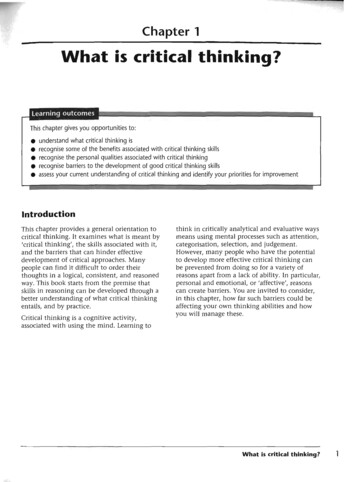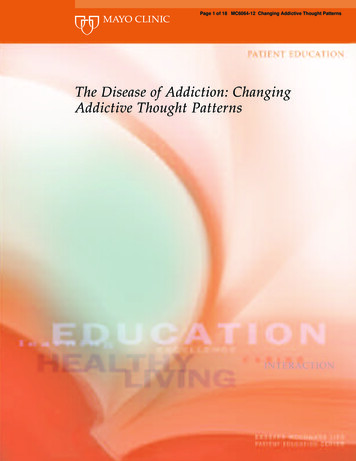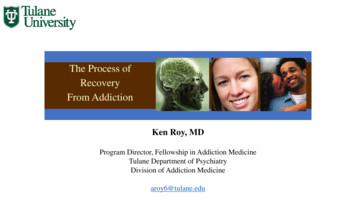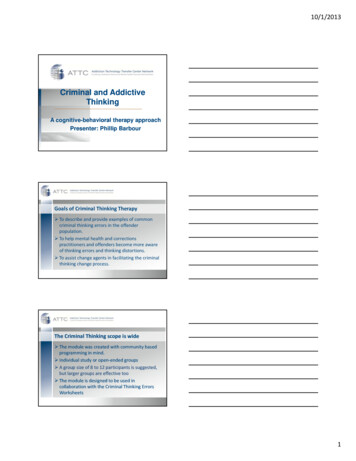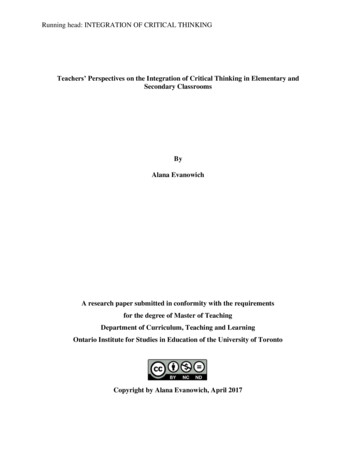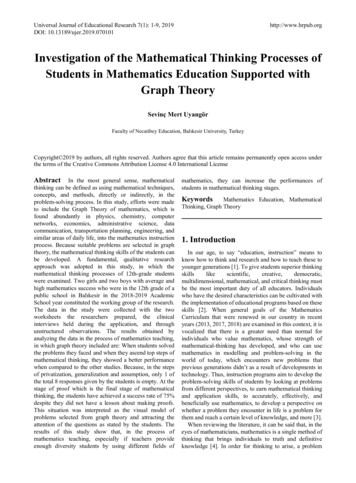
Transcription
So you are thinking aboutgraduate school . . . .
What are the kinds of thingsthat you might want toconsider? Location Prestige Unusual kinds offacilities (e.g.MURR) Famous in thearea you areinterested in Notable person Other reasons
How do I find out about aspecific program? ACS meetings Talk to faculty/gradstudents/visiting folks fromthat institution The Web Write the graduate coordinatorto request info Arrange a site visit/gradstudent weekend
Other sources American Chemical Societypublishes two useful books inthis area: the Directory ofGraduate Research and theChemical Sciences GraduateSchool Finder
The ACS Directory ofGraduate ResearchIs the most comprehensive source ofinformation on chemical research andresearchers at universities in the UnitedStates and Canada. Provides information on graduate programsfrom 12 disciplines within the chemicalsciences: chemistry, chemical engineering,biochemistry, medicinal/pharmaceuticalchemistry, clinical chemistry, polymerscience, food science, toxicology, marinescience, forensic science, materialsscience, and environmental science
The ACS Directory ofGraduate Research Contains information on degreesoffered, areas of specialization,and interdisciplinary programs. Lists faculty member biographicalinformation, area of specialization,titles of all papers publishedwithin the last two years,individual telephone numbers, andFAX numbers. Contains listings for 694 academicprograms, 12,365 faculty members,and 88,637 publication citations.
The first thing you must decide whencontemplating a move to graduate workis whether a masters or Ph.D. degreeis the desired goal. While the lengthof time required to obtain a Ph.D. (56 years) is considerably longer thanthat for a masters (2-3 years), aPh.D. is the preferred degree forresearch positions in industry,academia or the government andgenerally commands a higher salary.For an academic position as a facultymember at a four-year college oruniversity, a Ph.D. is a must.In addition, many schools prefer to admitstudents who are willing to commitseveral years to a Ph.D. program overthose students who apply for a mastersdegree. Discuss your choice of whichdegree to pursue with your facultyadvisor.
Standards for admission Graduateschools will look at four mainareas: Grades GRE scores Letters of recommendation Research experience
What you need to get in thedoor . . . The importance of letters ofrecommendation cannot be overemphasized. Strong referenceletters from chemistry professorscan bolster an application whichmight be weak in the areas ofgrades and test results. Thus, itis imperative that you introduceyourself to some of the facultymembers in the department and getto know them. Evidence in yourapplication that you have hadsome research experience willalso make a highly favorableimpression upon an admissioncommittee.
Fundage and the money side ofthis venture . . . Cost of graduate school Graduate work inchemistry is almost always fully fundedfor the student by the university throughteaching assistantships and/or researchassistantships. These assistantshipsprovide full tuition remission as well asa modest, but livable, monthly stipend. Inaddition, a number of fellowships areavailable for graduate students. The prestige associated with afellowship benefits the recipientthroughout her or his career inchemistry. Some people like to teach!!!
What do you want to do? How can you best determine your“field of endeavor”?– Work is a couple of different labsas an undergraduate researchassistant– TONS of summer internships andexternships are availablehttp://www.jobs.nih.gov/
What do you want to do? Go to National Meetings andtalk to people Read the current literature Become familiar with the trendsin your field
Other methods of decidingwhere to go . . . . Apply to a program that has aspecific plan or bent Apply to a program that has aspecific person / Apply to a program because ofother research facilities / Apply to a program because ofproximity to a beach or otheractivity ? if important
Situations to avoid(just my opinion!!!) Faculty members involved inunethical practices Programs without basic funding Dying areas of research Department heads as groupleaders/advisors (worked out VERYpoorly for a friend of mine!) Places that you know you won’t likebecause someone wants you to gothere!
Talk to faculty/grad students/visiting folks from that institution The Web Write the graduate coordinator to request info Arrange a site visit/grad student weekend . Other sources American Chemical Society publishes two useful books in this area: the Directory of Graduate Research and the Chemical Sciences Graduate School Finder . The ACS Directory of Graduate Research Is the .


